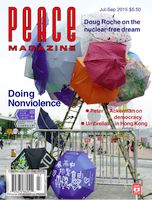
Peace Magazine Jul-Sep 2015, page 4. Some rights reserved.
Search for other articles by Metta Spencer here
This issue of Peace focuses largely on nonviolent civil resistance. Every peace worker in the world should learn techniques of nonviolent action and be able to use them appropriately.
But, as Peter Ackerman admits in this issue, “nonviolence can’t cure psoriasis.” Peace workers should not depend entirely on it because of its limits—the many things it cannot solve.
And we do not all recognize the same limits. A few of us reject violence even in self-defence. Other peace workers believe in using military or police force to protect vulnerable people from aggression. By now, the “Responsibility to Protect” principle is recognized as valid in international law, despite the numerous practical problems involved in implementing it.
But no one seems to be proposing that only nonviolent methods be used with ISIS—or Daesh, as it is known in the Arab world. In fact, peace workers offer no promising solutions at all.
The current war is mostly a sectarian fight among various Muslim groups. However, Daesh also wants the West (NATO) to put “boots on the ground,” since the more Muslims the West kills, the more new fighters they can recruit. If we stopped killing them, their rage against Western “infidels” would eventually end, deprived of its “oxygen.” Even Obama knows that, and the knowledge explains his hesitation to send US troops to the war.
But even if Westerners stayed out of the war altogether, Daesh would go on killing in vast numbers before the “suffocation” took effect. Few of us can in conscience advocate waiting passively while they slaughter innocents. We do have a “responsibility to protect,” though the use of violence for protection is counterproductive. What a dilemma!
So consider this strategy: “nonprovocative defence.” If military defenders (say, UN peacekeepers) would simply encircle and protect the vulnerable without retaliating against the attackers (in this case ISIS) they would give Daesh no basis for feeling assailed by nonbelievers. Our strictly defensive strategy would protect the vulnerable, kill far fewer people, and stop the provocations that feed the growth of the terrorist army.
Nonprovocative defence would preclude using bombers and drones, which are the “infidels’” offensive weapons. Also, it cannot solve conflicts within the branches of Islam—though it might help even with that if Sunni and Shia groups were to practice nonprovocative defence. Let’s think further about it.

Peace Magazine Jul-Sep 2015, page 4. Some rights reserved.
Search for other articles by Metta Spencer here